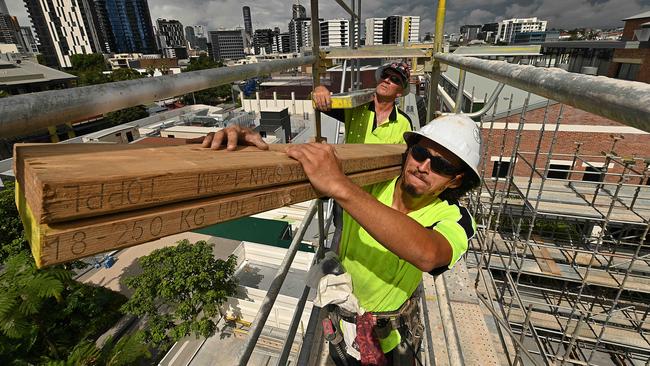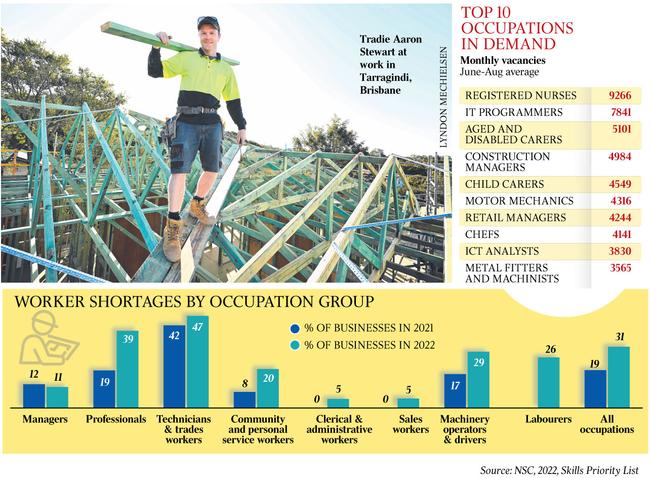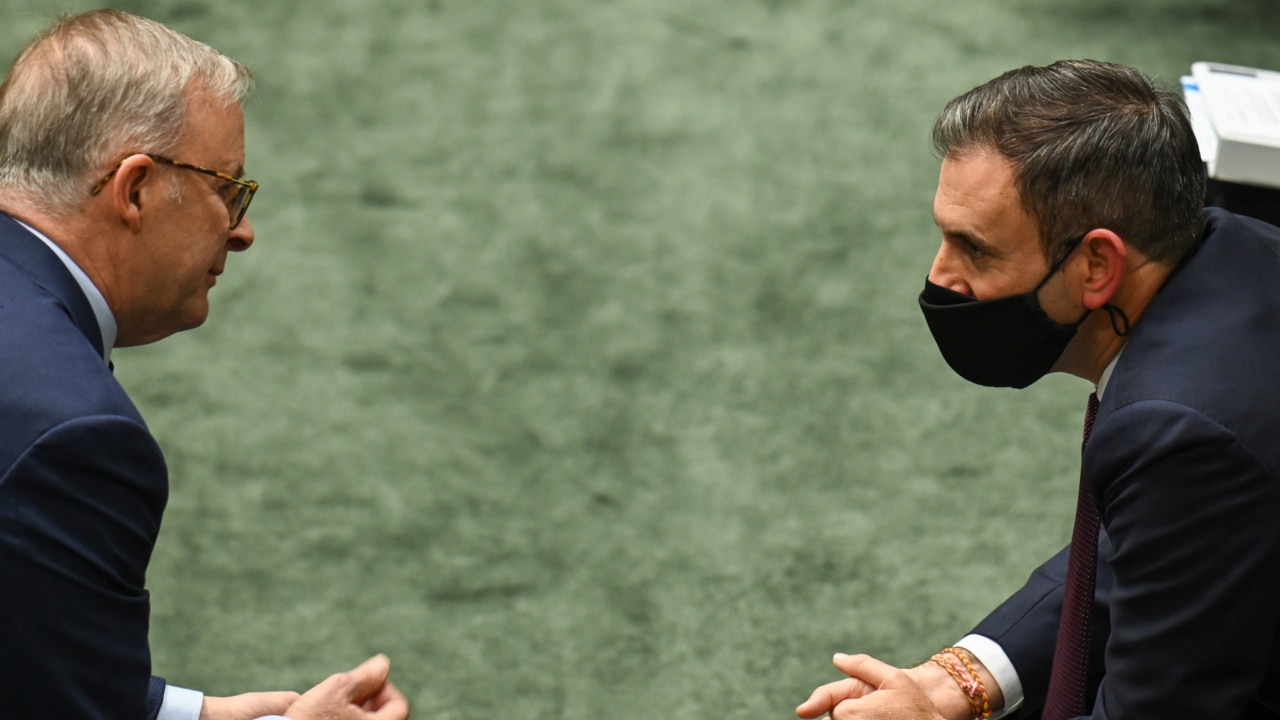Bosses crying out for workers as skills crisis bites
Crippling skills shortages have almost doubled in 12 months, with 286 occupations facing desperate worker shortfalls.

Crippling skills shortages across the economy have almost doubled in 12 months, with 286 occupations facing desperate worker shortfalls amid historically low unemployment levels and record job advertisements.
The workforce crisis is revealed in a new skills priority list released by the Albanese government on Thursday, which shows employers struggling to secure qualified tradies, teachers, engineers, drivers, GPs, tech workers, dentists, nurses, mechanics, psychologists, and aged care and childcare workers.
Ahead of unveiling major funding packages in the October 25 budget to train up Australians and bring in skilled migrants, Skills and Training Minister Brendan O’Connor described the year-on-year increase in national occupation shortages from 153 to 286 as “staggering”.
Mr O’Connor said more than half of the 20 largest employing occupations were facing skills shortages, with the health, building, education, tech and community sectors struggling to find experienced workers and regional centres unable to recruit professionals.
The skills priority list, which guides commonwealth policy and investment across skilled migration, apprenticeships, TAFE, higher education and JobSeeker pathways, will underpin budget funding boosts that are aimed at bridging workforce gaps.
“This is a staggering increase, highlighting the urgent need to respond to the biggest skills and labour shortages in decades, which is compounding economic challenges,” Mr O’Connor said.
“The demand for workers has grown, with the number of jobs advertised reaching 309,900 in August 2022 – a 42 per cent increase from the same time last year, with employers struggling to fill vacancies.”

As the labour shortage crisis nears emergency levels, Mr O’Connor will meet with state and territory skills ministers in Melbourne on Friday to discuss the national response and fast-track the $3.7bn five-year national skills agreement.
To provide immediate support for employers and regional communities, the Albanese government last month announced it was increasing the number of permanent migration visas this financial year by 35,000 – from 160,000 to 195,000.
The National Skills Commission, which will be abolished when Labor’s new Jobs and Skills Australia body is set-up following passage through the parliament, states that 31 per cent of 914 occupations assessed are now considered to be in shortage.
But instead of increasing pay for available jobs to attract staff, employers say they are more likely to keep advertising, restructure their organisation, give up on filling the position – or even change their job requirements.
Additions to the 2022 list of occupations reporting shortages include miners, drillers, truck and bus drivers, engineers, primary and secondary school teachers, IT specialists, butchers, beauticians, baggage handlers, aircraft ground crew, and scaffolders.
Health professions that are now on the list – which were not classified as being in shortage last year – include dentists, paediatricians, surgeons, gastroenterologists, emergency room doctors, and specialist registered nurses.
They add to existing shortages of GPs, obstetricians, dermatologists, anaesthetists, oncologists, psychiatrists, physiotherapists and midwives.
Anthony Albanese said the government was focused on “giving people on-the-job work experience” by unlocking more apprenticeship and traineeship pathways.
“Our jobs and skills summit highlighted the importance of quality training opportunities to ensure better jobs and a better future for Australians,” the Prime Minister said.

“(The) report shows the previous Liberal-National government dropped the ball on supporting these opportunities, meaning the number of professions now on the skills priority list has almost doubled,” he said.
“My government is focused on growing our vocational and training sector, delivering 465,000 fee-free TAFE places to help address skills shortages, and upgrading key TAFE infrastructure.”
The NSC skills priority report states that demand for workers has rapidly increased over the past two years, fuelled by the Covid-19 pandemic and global economic pressures.
The 20 most in-demand jobs in Australia include nurses, software and applications programmers, aged and disabled carers, construction and retail managers, child carers, mechanics, chefs, ICT analysts, metal fitters, civil and mining engineers, electricians, and GPs.
“A tightening labour market will generally indicate that employers will increasingly compete for workers, resulting in a greater number of occupations in shortage as employers are unable to fill advertised vacancies,” the NSC report states.
Nationals MP Anne Webster on Wednesday described GP shortages in the regions as “devastating”. Dr Webster said the “crisis is real” and raised concerns about locals in Mildura having limited access to doctors.
The regional Victorian MP proposed funding tuition fees for doctors who move to regional centres, and training doctors in the regions, with 60 per cent typically remaining to work locally.

The NSC states the proportion of health professional occupations in shortage has spiked by 47 per cent, with around half of health sector job vacancies remaining unfilled.
“The demand for health professionals has strengthened considerably in recent years. The number of advertised vacancies for these workers has increased significantly since early 2020, more than doubling to be at an historical peak in July 2022,” the NSC report states.
“Health professional occupations are predicted to experience moderate to high demand over the next five years. These findings are consistent with population ageing … placing upward pressure on demand for health professionals going forward.”
Occupations that have rebounded in the past 12 months and have moved off the shortage list include accountants, nursing support workers, pig and poultry farmers, ICT project managers, urban planners, train drivers, and biochemists.
The NSC report includes rankings for future demand jobs over the coming five years to help governments prioritise forward investment. According to national future demand ratings, IT, engineering, health, cyber security, aged care, community, professional, trades, mining, management and arts jobs are categorised as top priorities.

In response to labour shortages, the Albanese government has pledged to deliver 20,000 new university places and is working with states and territories to provide 180,000 fee-free TAFE places by 2023.
Opposition skills and training spokeswoman Sussan Ley said a damning Productivity Commission report released on Wednesday shows Labor’s free TAFE policy was “wrong”.
The PC report outlines a lack of focus in record education spending, falling reading, writing and numeracy standards, and plunging employment rates for graduates.
“According to the Productivity Commission, Labor’s free TAFE policy would not increase quality of outcomes for students, was unlikely to provide community-wide benefits, and would be better allocated elsewhere including by supporting students to access training at industry-led Registered Training Organisations,” Ms Ley said.
“The Productivity Commission also called out preferential funding for public training providers, a key feature of the Albanese government’s skills policies, concluding that there is also no evidence that the quality of delivery is higher at public TAFEs than private RTOs.
“It is time for Anthony Albanese and Brendan O’Connor to acknowledge that they got their skills policy wrong and change course. There is still time before they lock in wasteful spending commitments in the budget.”



